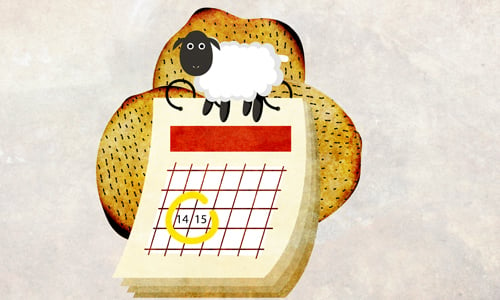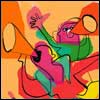I’m of Jewish ancestry but lived most of my life as a Christian. Now, after many decades, I’m returning to my roots and planning to hold a bona fide Seder for my family. I’m confused, however, regarding when to celebrate. In a number of places in the Bible it states that Passover is on the 14th of Nissan, yet the Jewish calendar shows Passover starting the following night, which is already the 15th of Nissan. How come?
Reply
Welcome home! How inspiring that you are reintroducing Judaism to your life and the life of your family.
In response to your question, you’re correct that the Torah refers to Passover on the 14th. But it also refers to the “Festival of Matzot” on the 15th. Why the discrepancy? Let’s examine these verses from Leviticus 23:
- “In the first month, on the 14th of the month, in the afternoon, the Passover to the L‑rd.”1
- “And on the 15th day of that month is the Festival of Matzahs to the L‑rd; you shall eat matzahs for a seven-day period.”2
So what is this “Passover” on the 14th? It is not the Festival of Matzahs, since that only begins that evening (since the Jewish days begin at nightfall). Rather, it is the Passover offering, which was slaughtered on the 14th and eaten that night—the 15th—together with matzah at the onset of the Festival of Matzahs.
The Name Change
Oddly, although the weeklong celebration is consistently called the Festival of Matzahs in the Torah, it has come to be known as Pesach, or Passover, in common parlance and even in our liturgy.
Why is that?
Rabbi Levi Yitzchak of Berditchev has a beautiful explanation for this: We, as G‑d’s children, love Him deeply and refer to the holiday as Pesach, Passover, because G‑d “passed over” our homes and spared us when he was smiting the Egyptian firstborns. G‑d, the ever-loving parent, calls it Chag Hamatzot, a reference to our preparing matzah in anticipation of our redemption, relying on G‑d to provide for us.
G‑d uses the name that recalls our goodness, and we use the name that recalls His kindness to us.3
A Long Day
Also note that, in a certain sense, the celebration of the 15th is considered to be an extension of the 14th. How so? With regard to sacrifices, the verse states, “And the flesh of his thanksgiving peace offering shall be eaten on the day it is offered up; he shall not leave any of it over until morning.”4 In other words, if you were given one day to eat an offering, the day consisted of the daytime followed by its night (unlike all other purposes, for which Jewish calendar days consist of the night followed by the day). Thus, as far as sacrifices are concerned, the night after a sacrifice is brought is an extension of the day it is brought.5
Therefore, when it comes to the celebration of the Passover sacrifice, while it was eaten on the 15th, it was considered to be the same day as the 14th.
The Celebration of the 14th of Nissan
Today, even though the Temple has been destroyed and we no longer offer Passover sacrificial lambs (or other sacrifices for that matter), the Passover of the 14th of Nissan is not forgotten. Indeed, it still has practical implications for us:
1. The Torah tells us that we were not to sacrifice the lamb while we had leavened bread in our possession.6 Even in our times, we rid ourselves of all leaven before midday of the 14th of Nissan, the time when the sacrifice was once brought. (For exact times in your location, see here.)
2. Additionally, the day that one would bring a sacrifice in the Temple was considered a minor holiday, and people would refrain from working. Today, we still refrain from doing work on the 14th. (This work restriction is not the same as a full-on holiday. You may make any preparations you need for the holiday that will begin that night on the 15th. If you need to do other kinds of work, please feel free to discuss the specifics with a rabbi).
3. Many also “reenact” the day’s sacrifices by reading how it would take place in the Temple. You can find a standard text printed in the Chabad siddur, and you can supplement it with as much additional detail as you wish.
Our observances of the 14th of Nissan are also an expression of our fervent hopes and prayers that the Temple be rebuilt speedily in our days and we once again bring an actual Passover lamb on this day.
As we conclude in the Passover Haggadah, “Next year in Jerusalem!”
PS: Please note that in the diaspora, both the 15th and 16th of Nissan are celebrated as the first day of Passover. This “doubling” is something we do for almost all Biblical holidays. For more on how that works please see here.
For more on the laws, custom, insights and stories of Passover, as well as the complete Haggadah text, visit our Passover megasite, Passover.org.







Join the Discussion